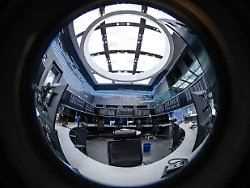Friday 13th August 2021
The Dax ignites the turbo
Why the records are falling on the stock market
The stock exchanges continue to look up. Given the current strong economy, is that justified or exaggerated? The central banks play a central role in future performance.
Delta variant, fears of lockdown, rising inflation, a usually dreary stock market month of August – and yet investors are happily picking up stocks. The fear of missing the train seems too great. At 16,000 points, the German Dax share index is higher than ever before. It is already the third thousand mark that the Dax will crack in 2021. The share price is now up by almost 17 percent, similar to what is probably the most famous stock index in the world, the Dow Jones.
Some investors have recently held back in the hope of more favorable purchase prices and are now under pressure, said Thomas Altmann from asset manager QC Partners. Fund managers can quickly find it difficult to explain to their clients if they are not keeping pace with the market. Others see the breakout of the Dax to highs after the search for direction in the past few weeks as a fundamentally positive signal. So they continued to add to their equity positions.
So the Dax had not moved since the beginning of June. Concerns about the rapid spread of the delta variant of the corona virus and high inflation rates were too great. Extensive corona lockdowns and strong inflation could stifle the global economic recovery, they feared. At least in the USA and many European countries, the authorities are now dealing with the corona situation more relaxed, even the summer vacation does not seem to be in danger.
And inflation is – at least currently – hardly a disruptive factor in people’s minds. Your rise will be accepted. After all, this is only temporary and owed to the pandemic year 2020, at least that is the thesis of the central banks. The coming months will show whether they are right.
“Super results are ignored”
Many companies have felt the rise in prices for a while, but pass them on to their customers as far as possible. Overall, business has recently been good, as an analysis of the reporting season for the second quarter by the US bank JPMorgan shows: “The sales trend in the USA and Europe is robust.” The proportion of companies that exceeded expectations has shot up in both regions and has reached its highest level in a decade in the US.
However, JPMorgan expert Mislav Matejka explains that the prices of many stocks have only reacted to a limited extent to the good business developments. The long-time market observer Hans Bernecker came to a similar conclusion in his letter “Die Actien-Börse”, despite the latest DAX record: “The great results of all companies are accepted, but hardly rewarded.”
Bernecker warns against too much euphoria. The current level of the stock markets is entirely justified, but much larger jumps appear unlikely in the short term. “The markets are preparing for the end of the ultra-light monetary policy early on, regardless of when it begins.” According to data from Bank of America, large fund managers in particular seemed to be increasing their cash reserves and slightly lowering the equity exposure in their portfolios.
The central banks, above all the Federal Reserve (Fed) in the USA, are trying cautiously to prepare the markets for at least a slight tightening of monetary policy, which they had recently loosened again due to the corona crisis. A look at 2018 shows that kid gloves are absolutely appropriate. At that time, Fed Chairman Jerome Powell brought a normalization of monetary policy into play. As a result, the stock exchange prices fell sharply towards the end of the year.
Is the setback coming?
According to Fed critics such as the market strategist Albert Edwards of the French bank Société Générale, the stock markets have long been dependent on ultra-cheap money. “Central banks are slaves to the bubbles they create,” wrote Edwards recently in his widely acclaimed Global Strategy Weekly. The markets – meaning the behavior of investors – are basically forcing the Fed to quickly pull back on tightening monetary policy.
This is how a lot of cheap money has been flowing into the stock markets for years – also due to the lack of alternatives. If rising interest rates slow down the flow of money or make other investments such as account balances more attractive, investors are likely to withdraw at least some of their funds from the stock market. If this happens on a large scale, prices can slide sharply – with consequences for consumption and the real economy.
Bernecker is more confident there. In his view, investors should be prepared for a change in monetary policy. Therefore, there is a risk of a restless autumn on the stock exchange – possibly also because of growing concerns as a result of the corona pandemic. However, he only anticipates a “technical correction”, ie only a more pronounced setback, but no reversal of the long-term positive trend on the stock markets.
.
